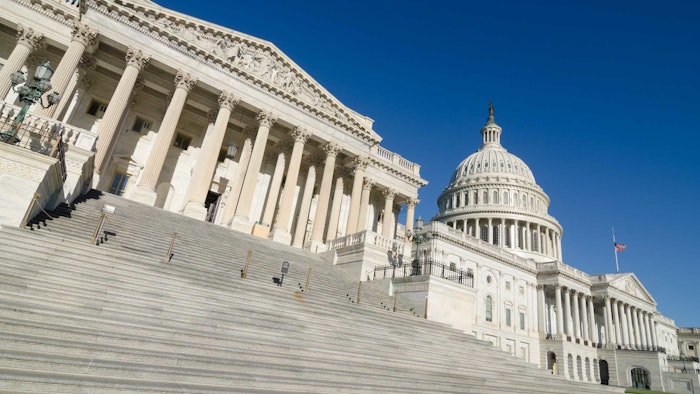
Editor's note: This commentary from Matthew Zoeller, applications director for specialty chemicals at 3V Sigma USA, critiques the U.S. Food and Drug Administration's (FDA's) approach to cosmetics regulation through the Modernization of Cosmetics Regulation Act of 2022 (MoCRA). It highlights the FDA's "lethargy" in the "face of realpolitik" and calls out state control over the FDA, among other issues. While it does not necessarily reflect the opinions of C&T, we offer it for your consideration and investigation.
Log in to view the full article
Editor's note: This commentary from Matthew Zoeller, applications director for specialty chemicals at 3V Sigma USA, critiques the U.S. Food and Drug Administration's (FDA's) approach to cosmetics regulation through the Modernization of Cosmetics Regulation Act of 2022 (MoCRA). It highlights the FDA's "lethargy" in the "face of realpolitik" and calls out state control over the FDA, among other issues. While it does not necessarily reflect the opinions of C&T, we offer it for your consideration and investigation.
Speaking at a technical seminar hosted by the Midwest Chapter of the Society of Cosmetic Chemists in October 2023, I was taken aback by the audience reacting to my highlighting a major weakness in the Modernization of Cosmetics Regulation Act of 2022 (MoCRA.) During my talk, I made much of the avoidance strategy taken by the FDA to side-step its rightful need to empower agency control over all injunctions and prohibitions enacted by U.S. states over the past 40 years.
This federalist approach to conveying central legislative control over cosmetic manufacturing and labeling would be justified by our U.S. Constitution, specifically the Interstate Commerce Clause (Article 1, Section 8, Clause 3.) Instead of using the MoCRA Act to retract and subsume the many state and multiple-party mandates governing our industry, however, the FDA tabled it and moved on.
Realpolitik Drivers and State Control
We may understand the reticence of the FDA invoking federal oversight of restrictions on cosmetic ingredients and labeling derives from realpolitik. The avoidance strategy the agency took in claiming rightful control while enacting MoCRA is revealing. The agency no doubt considered and bowed to the realpolitik implication this would incur in the form of backlash from the states and other constituencies such as the Environmental Working Group.
While the MoCRA Act provided the FDA with a once-in-a-lifetime chance to set matters right and take federal responsibility for full industry regulation, the agency chose not to, and prolonged the chaotic mess our industry has dealt with for so long. The act is quite specific in this intention not to overturn or interfere with states’ rights to legislate and govern our industry from the back of the room.
As I stated in my speech that day: thus, "the tail will continue to wag the dog" unlike virtually every national trading partner with the USA. In most other nations, federal control overrules provincial control and may negate provincial referenda whenever and wherever the federal body deems necessary.
Federal Over Provincial Rule
As an example, in the European Union (EU), Luxembourg lacks the authority to arbitrarily prohibit ingredients already allowed in cosmetics formulation and assume all other EU states will comply. It must petition the European Chemicals Agency and carry the burden of proof in doing so, while other EU states may disregard until a ruling occurs.
This holds for all Asian nations; China being the example where federal statutes of the National Institutes for Food and Drug Control are the sole guidance documents for regulation of cosmetic products. In the United States, even territories such as the American Virgin Islands can prohibit cosmetic ingredients and enforce litigation actions if disregarded.
Interstate Commerce Clause and State Rights
The ongoing actions of U.S. states to prohibit ingredients in foods, cosmetics and other contact articles is part of the decades-long brandishing of the Interstate Commerce Clause of our Constitution. Article 1, Section 8.
- Clause 3: To regulate commerce with foreign nations, and among the several states, and with the Indian Tribes
In passing many laws, the U.S. Congress draws its authority from this, which grants it the power to regulate business activities “among the several states.” Over the years, Congress has relied on the Commerce Clause to pass environmental and consumer protection laws because the conduct of business requires materials and products to cross state lines.
Our FDA already does so in regulating interstate commerce of drugs and foodstuffs (but not so much alcohol and tobacco—another story.) This renders agency inaction on the arbitrary interstate regulation of cosmetics unusual; or frankly, weird.
It must be said the scope of the laws passed under the Commerce Clause is not unlimited. Concerned about the rights of the states, the U.S. Supreme Court (SCOTUS) has, from time to time, issued rulings limiting the power of Congress to pass legislation under this clause or other powers contained in Article I, Section 8.
SCOTUS has overturned federal laws intended to protect abused women on the grounds that such localized police matters should be regulated by the states. However, this indicates federal retreat on legislative controls placed on people and behaviors, not material products. That is a far more complex and politically sensitive objective.
Determining chemical and label content controls of personal care products distributed within the U.S. does not qualify as an end game to strip states of their rights, or to force public health endangerment on the American people by an unreconciled FDA.
Federal Guidance for Scientific Rigor
On the recent prohibition by the state of California's legislature of propylparaben and Red #3, along with the reintroduction of titanium dioxide in foods, Governor Gavin Newsom stated:
“Signing this into law is a positive step forward on these food additives until the United States Food and Drug Administration (FDA) reviews and establishes national updated safety levels for these additives.”
Here, Newsom is de-emphasizing the role states play in prohibiting the use of ingredients in nutritionals and cosmetics. He indicates the "tail" (states) will "wag the dog" (FDA) until the dog wakes up and snaps back; indeed, the governor of California, the most restrictive state in the U.S., is virtually asking for federal guidance and control over ingredient allowances.
Responding to the California code, a leading nutritionals industry group had this to say about states taking actions on foods:
“California is once again making decisions based on soundbites rather than science,” the National Confectioners Association said in a statement after Newsom signed AB-418. “This law replaces a uniform national food safety system with a patchwork of inconsistent state requirements created by legislative fiat that will increase food costs.
"This is a slippery slope that the FDA could prevent by engaging on this important topic. We should be relying on the scientific rigor of the FDA in terms of evaluating the safety of food ingredients and additives.”
This statement easily applies to cosmetics manufacture in the USA and the slippery slope mentioned has been under our industry’s feet for nearly 40 years beginning with California Proposition 65 in 1986. Most cosmetic formulators in this day have long forgotten Prop 65 was enacted to regulate contaminants in drinking water, not products on store shelves applied to humans topically.
I recall there was remedial action taken to reverse this overreach by the states when e-commerce began to gain significant market share, but that movement died as did many others.
FDA Governance Deficit and Drug Focus
Returning to Article 1, section 8 of our Constitution, let’s reiterate another clause in the context of interstate commerce and the other guiding powers of Congress:
- Clause 18: To make all laws which shall be necessary and proper for carrying into execution the foregoing powers, and all other powers vested by this Constitution in the government of the United States, or in any department or officer thereof
The Constitution (We the People) clearly empowers the FDA, a “Department,” to guide all laws necessary and proper for “carrying into execution” controls governing what exactly should be allowed in cosmetic products and labels throughout our nation.
This is a deficit in governance that has been overlooked too long by industry actors and the U.S. consumer base, the very populace the FDA was commissioned to serve and protect. The irony is aggravated by the fact that the agency has long been fixated on regulation of drugs, whereas cosmetics have been treated as a contemplative side story all along. This preoccupation with drug product governance is not unwarranted. Drugs are more invasive and critical to human health, and pose far greater impact on mortality and disease outcomes.
FDA Oversight of Foods and USDA Inspections
The other side to this anomaly lies in the FDA's oversight of foods and food ingredients. A recent episode of the television show Last Week Tonight with John Oliver underscored the observation that the FDA preoccupation with drug safety has shortchanged the American consumer on food safety. Food safety recalls dwarf those of drugs and cosmetics. The show's investigation pointed out our reliance on U.S. Department of Agriculture (USDA) facility inspection, which is parallel to FDA inspection, as a safeguard on food safety compliance.
The fact that the nearly 800 USDA inspectors are mainly concerned with meat conversion facilities, and rarely ever inspect farms, vegetable converters, food processors and the many natural health product manufacturers, is lost on most people. The peril in this paradox is most serious health threats arise from those facilities not undergoing constant USDA oversight and inspection.
Removing Constraints on the FDA
This commentary is not meant as a demonizing critique of our FDA. This agency our personal care product industry relies on for competent legislation and compliance action has been underfunded, understaffed and overwhelmed by modern commercial drug interests for years. Writers on The Last Week make a fine suggestion that has been offered before: consider reorganizing the FDA into separate agencies and jurisdictions.
This would entail cleaving off and granting food safety under the sole aegis of the USDA, then granting more funding, staffing and oversight of our food supply chain; one separated completely from cosmetics and drugs. We could remove the constraints to food safety oversight and allow the FDA to focus on drugs, cosmetics, nutritionals and their ingredients and labeling under a new name: the Drug, Cosmetics and Nutritionals Authority (DCNA).
Conclusions
It is surprising to this author that the points raised have not been protested as loudly as they could have been over my many years in our industry. All industry participants have abdicated to the will of the states seemingly with little recourse, regret or rebuttal.
If a collective protest could create a call to action by consumer groups favoring federal control over personal care product governance, forcing the states and the non-state actors out of the picture, all U.S. citizens and business sectors would be better served.










